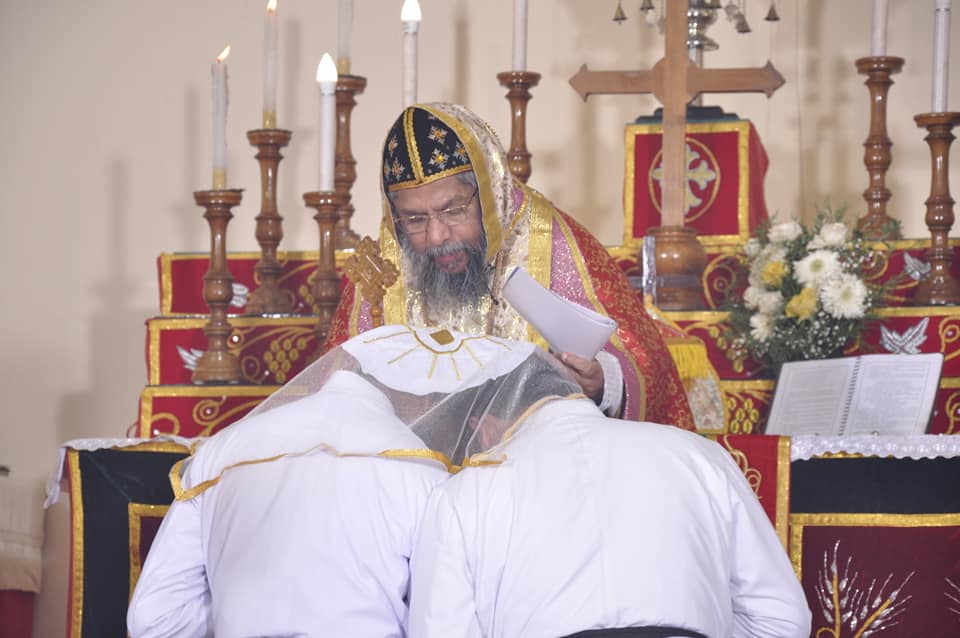It is that time of the year again when young men who have completed their theological studies will be ordained as priests through the sacrament of Holy Ordination. In the Mar Thoma Syrian Church and other churches within the Syriac tradition, the priest is given the title of “Qashisha” (ܩܲܫܝܼܫܵܐ) or “Qasha” (ܩܵܫܵܐ), which translates to “elder” or “ancestor” with legal power. The Holy Ordination service, which in itself is beautiful and mystical is initiated between the greatest mystery, the Holy Qurbana service or the Eucharistic service. The author has chosen to break down the ordination service into different parts to enhance readability and retain important information.
After the recital of the Nicene Creed and the sacrament of Confession, the candidate to the Holy Priesthood, kneels in the middle of the Madbaha (Inner Sanctum). He remains in his knees during the Words of Institution, the Epiclesis (invocation of the Holy Spirit) and the prayers of intercession. Once the verse related to the remembrance of our saintly ancestors ( Daiva Suthar/In all our prayers and offerings…) and Kukliyons (verses from Psalms) are sung, the Episcopa will sit on his throne and read out the Omologia for the candidate.
The Omologia
“Omologia” (ομολογια) is a Greek word that means a common confession or a collective agreement. The Omologia is read out to the candidate by the bishop as a profession of faith and doctrinal exhortation. The bishop will list a few things that the candidate for priesthood must accept and continue to follow throughout his life as a priest. The following can be noted from within the exhortation :
1) The bishop addresses the candidate as his brother of true faith in Christ, a dear spiritual son and a member on the right side.
2) The first reminder to the candidate is to uphold the Orthodox/True Faith taught by the Lord Jesus Christ to His Holy Apostles which is recorded within the Holy Gospel; and which the apostles entrusted with the Holy Fathers and teachers who taught this across the four quarters of the world.
3) The candidate to exhorted to primarily uphold the faith in One God, who is the Father, the Son, and the Holy Spirit. The candidate must uphold this truth in publicly and privately and in his heart and tongue.
4) The candidate must believe in The Word ( Jesus Christ) who is one among the Trinity, who came down from heaven and dwelt in the womb of the virgin Saint Mary and was incarnate due to His love for mankind. He must uphold the truth that when Jesus Christ was in the womb of His mother, He was at the same moment existing with His Father on the heavenly throne. He must loudly proclaim that Jesus Christ is the true God and true Man.
5) The candidate is then asked to follow in the footsteps of Saint Peter, the Chief Apostle, Saint Thomas who brought the Orthodox Faith to India, and their comrades, the seventy-two evangelists, Saint Ignatius of Antioch, and all the fathers who followed. The candidate must be obedient to the bishop who is giving him the ordination and to His Beatitude The Mar Thoma Metropolitan, who governs the Universal Church of Mar Thoma Christians. Both of them have followed in the footsteps of the Holy Apostles and Fathers of the Church.
6) The ordinand is asked to renounce every faith proclaimed by the Gentiles, the heretics, and the Gnostics.
After the above six exhortations, the candidate openly renounces everything the Bishop renounces and confesses to everything that the Bishop confesses.
7) The candidate is then exhorted upon his moral and spiritual life based on what Saint Paul the Apostle has written. He must move away from carnality, alcoholism, wasteful extravagance, falsehood, avarice, adultery, theft, jealousy, anger, heresies and slander. (1 Timothy 3:2-3)
8) The ordinand is told that he must be meek, humble and temperate. He must be able to govern his household well and must raise his children in holiness and humility because if he does not know how to lead his home well, he will never be able to lead the Church of God.
9) The candidate must not fall into the traps laid down by Satan and must have good witness among the public. He must not open his mouth to speak ill or to curse. He must not have a vengeful spirit toward his enemies and must stay away from the corruption of interest and compound interest which steal the wealth of the world.
10) He must pray and fast in the presence of God with tears for himself and for all the people that he has been entrusted with.
11) The candidate is called to love the aliens in the land, and the poor and should treat all people with love, kindness, forgiveness and faithfulness, for these are the fruits of the Spirit.
12) The bishop asks the candidate to do all this so that he will receive mercy and favour when our Lord Jesus Christ will return to judge the living and the dead.
13) Finally the Bishop once again reminds the candidate that he is in front of the Throne of God, the holy Angels and martyrs, the priests and elders and all the faithful. The bishop then commands the candidate that he must not challenge the Orthodox faith that is entrusted to him and must not bring any change to it for both of them will be answerable for it before the throne of God when Christ the Messiah returns in His glory.
Once the exhortations are over, the candidate is asked to draw the Sleeba (cross), affirming his faithfulness to the Church and all the advice that was given to him.
On the next part, we will explore the theological aspects until the recitation of the Nicene Creed embedded in the Liturgy of the Holy Ordination service.
